Go Green Save Green: Advantages of Installing a 1000 kWh Solar System

A 1000 kWh solar system is a photovoltaic (PV) system capable of generating 1000 kilowatt hours (kWh) of electricity over some time, typically a month or a year.
The size of a solar array is often determined by its power output capacity, expressed in kilowatts (kW), which represents the maximum amount of electricity it can produce at any given time.
A 1000kWh solar system can be designed using solar panels, inverters, and other components needed to convert sunlight into electricity.
The number and size of solar panels required to achieve this capacity can vary depending on the efficiency and power of the panels used. In addition, the system can be battery-powered or connected to the grid to store excess energy or provide power during periods of low solar radiation.

The energy produced by a 1000kWh solar system can offset a significant portion of a household’s electricity consumption, depending on local energy needs and solar conditions.
This can help reduce carbon emissions and potentially save on utility bills, especially if net metering or feed-in tariff programs are available in the area.
Solar Panels Monthly Efficiency
Currently, the efficiency range, i.e. the amount of solar energy that hits the solar cell and is converted into electricity, is around 18% on average but can vary depending on the quality of the solar panel.
A high-end panel made from more expensive materials is more expensive and more efficient. You can check out our updated list of the best solar panels currently available in the US.
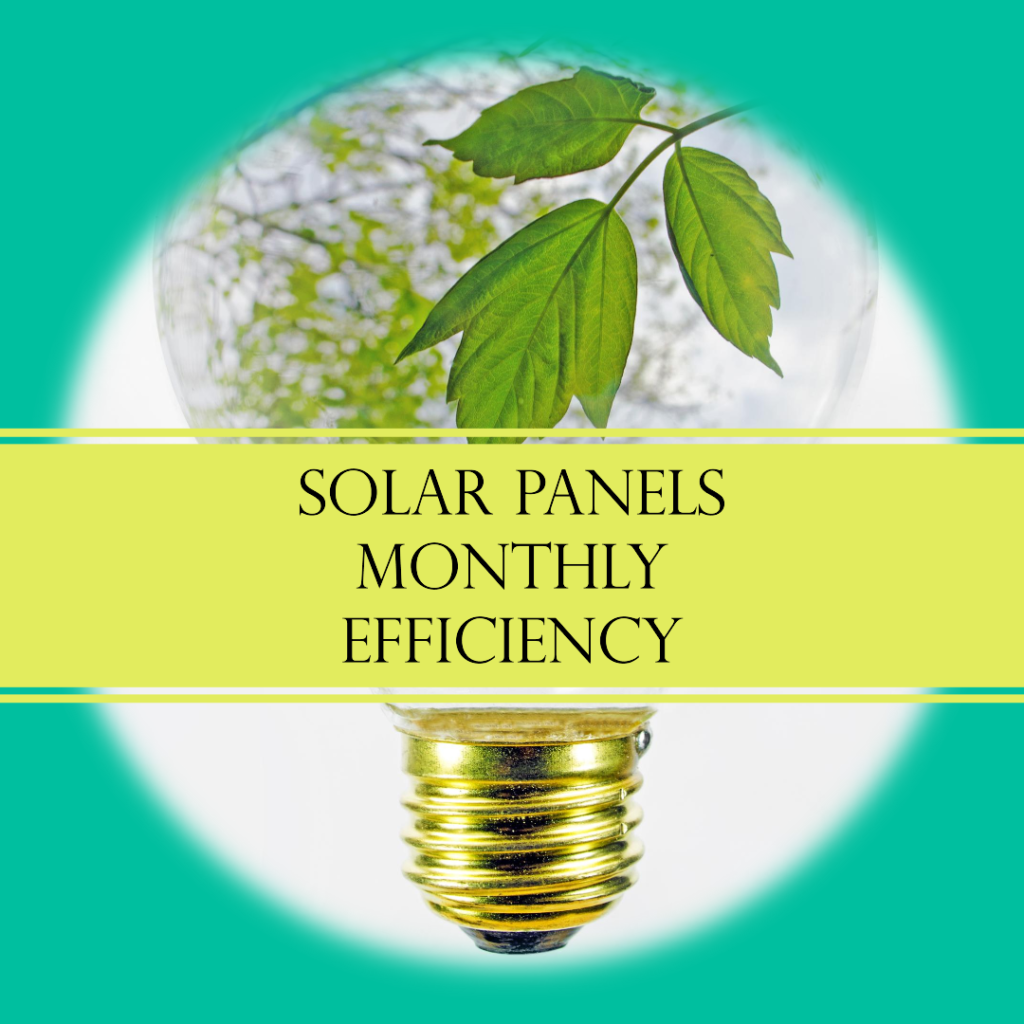
A solar panel generates approximately 265 watts of electricity per hour at an efficiency of 20%. Manufacturers must label the panels with the number of kilowatts they will produce under ideal conditions, ie.
In direct sunlight on a clear, sunny day, per hour. The Standard Test Condition (STC) rating, for instance, is 265 if the panel is putting out 265 watts of power.
Generator kWh Per Month
The average yearly solar panel wattage per day in kWh for locations in the United States may be calculated on many websites for solar energy companies.
Adding up all of the sun that falls on the solar panel in a 24-hour period, the average rooftop in the United States receives approximately four hours of “full” or “useful” sunlight per day. Again, this number depends on whether you live in a cloudless desert or in misty mountains.
For Example, There is a map from Statista showing the solar energy potential in each state in the United States.
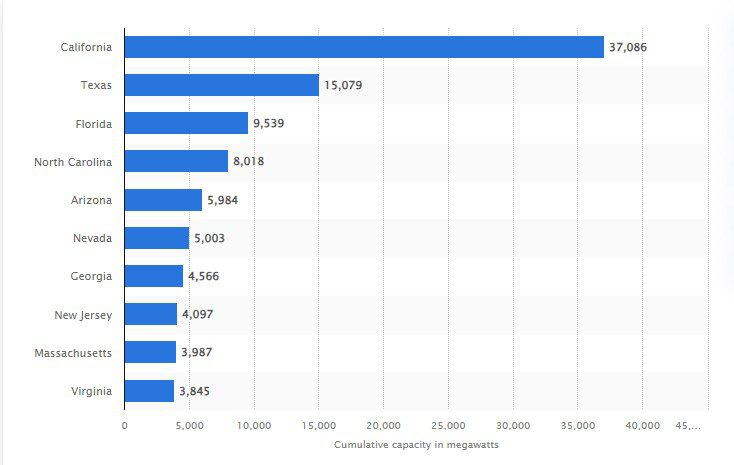
However, he points out that this estimate is based on a south-facing panel and that you need to consider the pitch of your roof, and points out that a west-facing solar panel instead of a south-facing solar panel may result in a reduction in the production of almost 11%.
Output efficiency
Unfortunately, solar panels rarely (if ever) reach their full-rated output. A solar array can lose 10–20% or more of its effectiveness due to temperature, dirt, and other variables. Several factors can affect the efficiency and performance of solar panels. Here are some key factors affecting the performance of solar panels:
Sunlight Intensity:
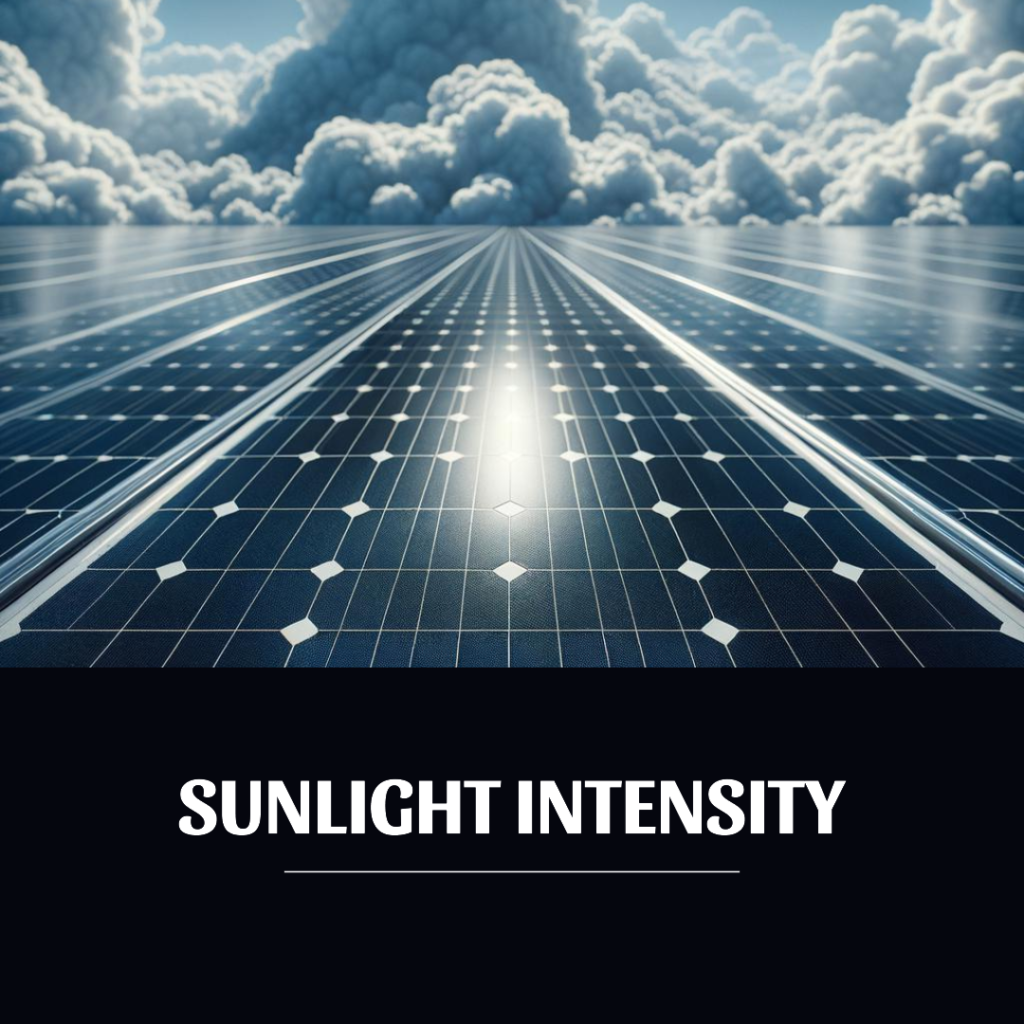
The sun is the primary source of energy for solar panels. The intensity of sunlight directly affects the performance of solar panels. Areas with more direct and intense solar radiation, such as regions closer to the equator, tend to have higher solar panel efficiencies.
Orientation and Inclination of Solar Panel:
The orientation and tilt angle of solar panels play a crucial role in optimizing their efficiency. Solar panels are typically installed facing south in the northern hemisphere and facing north in the southern hemisphere to maximize solar gain.
The tilt angle is adjusted based on the latitude of the installation location to ensure the panels receive as much light as possible throughout the day.
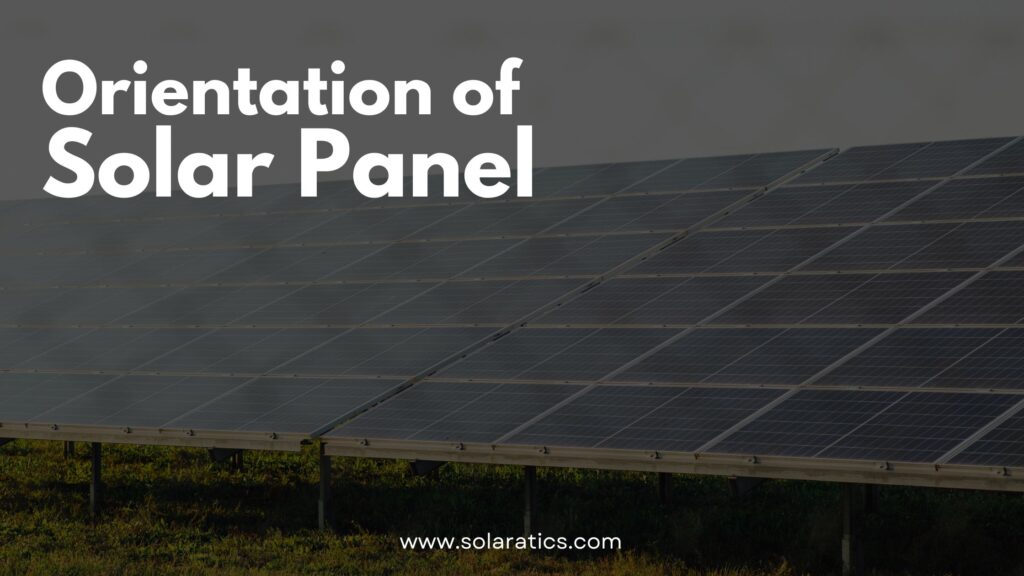
The Shade:
Shading can have a significant impact on the efficiency of solar panels. Even partial shading of a solar module can lead to reduced production.
It is important to minimize obstacles such as nearby trees, buildings, or structures that could cast shadows on the panels, particularly during peak hours of sunshine.
Montage System:
The mounting system supports the solar panels and keeps them properly aligned to maximize sunlight absorption. Depending on the mounting location, there are different types of mounting systems, such as roof racks or floor racks.
Converter:
Solar panels generate direct current (DC), while most appliances and the power grid run on alternating current (AC). An inverter converts the direct current generated by solar panels into alternating current, making it compatible with a building’s electrical system or the grid.
Charge controller (For Battery Systems):
When batteries are present in the system, a charge controller is used to regulate the charging process and prevent overcharging or over-discharging, which can shorten battery life. It ensures efficient and safe battery operation.
Advantages of a 1000 kWh solar system
The 1000 kWh solar system offers some advantages listed below.
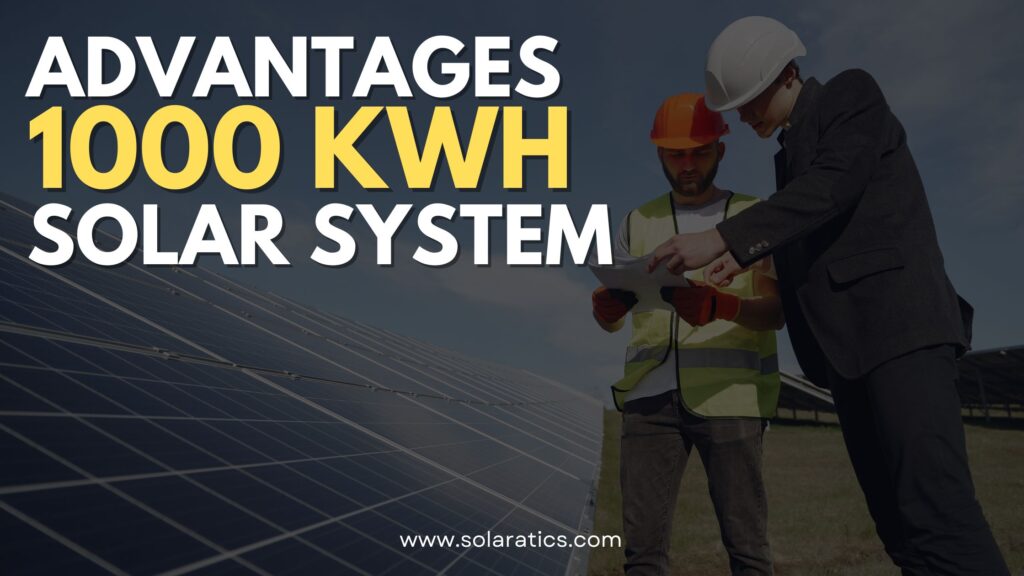
Renewable energy:
Solar energy is clean and renewable, reduces dependence on fossil fuels, and helps mitigate climate change. The installation of a 1000 kWh solar system contributes to a sustainable energy future.
Saving measures:
By generating electricity from the sun, homeowners can reduce their dependence on the grid and lower their energy bills. Over time, the savings in electricity costs can offset the initial investment in installing the solar system.
Energy Independence:
A solar system offers certain energy independence, especially in off-grid installations. This allows owners to generate their own electricity and is less dependent on external energy sources.
Environmental Benefits:
Solar energy is a clean source of energy and produces no greenhouse gas emissions when in use. It helps reduce air pollution, water use, and the overall carbon footprint associated with traditional methods of generating electricity.
Long life expectancy:
Solar panels have a long lifespan, typically 25-30 years or more. With proper maintenance and care, a 1000kWh solar array can provide decades of clean energy.
The Cost of a 1,000 kWh per Month Solar System
A solar system that can generate 1,000 kWh of electricity per month is like having your own personal power plant, fueled by the sun’s energy. It’s like having a magic money-saving machine that makes your electricity bills smaller or even disappear.
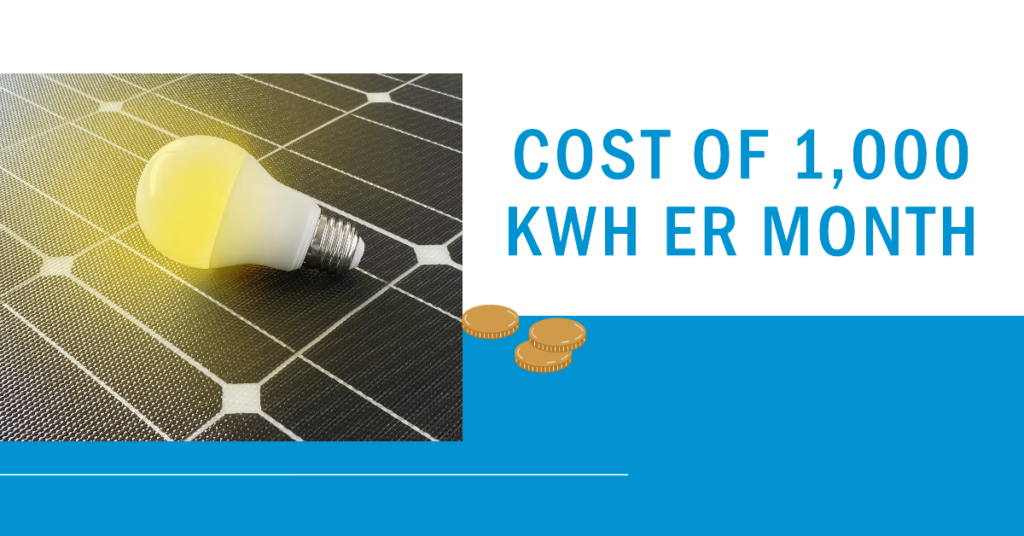
The cost of this amazing system can vary depending on where you live, how big the system needs to be, and how hard it is to install. But it usually costs between $5,000 and $10,000.
Think of it like buying a new toy for your house that keeps on giving. You might pay a bit upfront, but you’ll save money on electricity for years to come. And your house will be worth more because it has a solar system!
So, if you’re thinking about going solar, don’t worry about the cost. Think about all the benefits you’ll get in the long run!
Also Read: Benefits of Solar Energy to The Environment & Impact of Traditional Energy Source
Conclusion
In conclusion, a 1000 kWh solar system offers numerous advantages that make it a compelling choice for homeowners seeking sustainable energy solutions.
By adopting renewable energy, such a system contributes to a cleaner environment by reducing dependence on fossil fuels and minimizing greenhouse gas emissions.
Additionally, the financial benefits cannot be overlooked, as homeowners can experience significant savings on their electricity bills over time.
With the potential for energy independence and long-term durability, a 1000 kWh solar system becomes an investment in an economically and environmentally brighter future.
By embracing solar energy, individuals can enjoy clean, reliable power generation for years to come, while making a positive impact on the planet.
You Should Read
WHAT IS SOLAR PANEL | THINGS YOU NEED TO KNOW and to Get In Touch with us Use the Contact page
FAQs

A 1000 kWh solar system is a photovoltaic (PV) system capable of generating 1000 kilowatt hours (kWh) of electricity over a period of time, typically a month or a year.
A 1000 kWh solar system consists of solar panels that convert sunlight into electricity, inverters that convert the direct current (DC) generated by the panels into alternating current (AC), and other components that enable energy storage or grid connection.
The amount of savings varies depending on factors such as energy consumption, local electricity rates, and solar conditions. However, homeowners can potentially experience significant savings on their utility bills over time by reducing their reliance on grid electricity.
The capacity of a 1000 kWh solar system may vary depending on individual energy needs. It is advisable to consult with a solar energy professional to determine. The system size required to meet your specific electricity demands.
Yes, a 1000 kWh solar system can provide energy independence, making it a viable option for off-grid installations. With the addition of battery storage, excess energy is generated. During the day can be stored for use during times of low solar radiation.
Government incentives and rebates for solar installations vary by location. It is recommended to research local programs and consult with solar installation companies to explore available incentives. Such as tax credits or feed-in tariff programs.
Solar panels typically have a lifespan of 25-30 years or more. With proper maintenance and care, a 1000 kWh solar system can provide decades of clean energy production.
